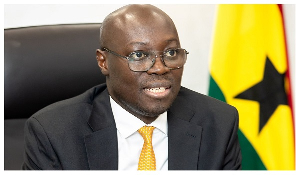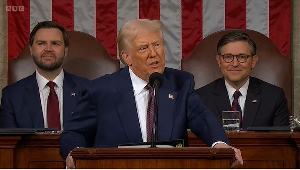Officials of the Ghana Investment Promotion Centre (GIPC) led by the Chief Executive Officer (CEO), Mrs Mawuena Trebarh, were told yesterday at the public hearing of the Public Accounts Committee (PAC) that the centre should wean itself off government subvention because the centre could afford to pay GHC22,715 as donations to institutions and individuals with a budget surplus of GHC848,377 in 2011.
The chairman of the committee, Kwaku Agyeman-Manu, told the GIPC officials that if the centre could consistently record a budget surplus over the past years, then it was time it weaned itself off government subvention so that those surpluses could be used by government in other sectors of the economy to benefit Ghanaians.
The issue that angered committee members was the fact that an amount of GHC6,000 was budgeted by the centre to meet donations expenses in 2011, but it ended up overrunning its donation budget by 279 per cent thereby increasing the amount to GHC22,715.
The committee members thought because of the huge surpluses, the centre could decide to use its finances ‘anyhow’.
The total income made by the GIPC in 2011 was GHC7,308, consisting of internally generated funds of GHC6,209,267, private sector development strategy grant of GHC96,230, government subvention of GHC630,298 and other incomes totalling GHC372,544.
The total expenditure made by the GIPC in the same year was, however, GHC6,459,962 as against the total income of GHC7,308,339 with a surplus of GHC848,337 which was kept in the coffers of the centre.
The chairman of the committee said looking at the distressed financial situation in which the country finds itself, it would be prudent for the centre to forfeit its government subvention so that it could be channelled into other sectors of the economy especially in providing good roads in the rural areas to attract investments to those areas.
“I sincerely believe you could depend on your internally generated funds as well as other incomes that you make to finance your operations so we will make this suggestion in our recommendations to government,” he said.
Mr Agyeman-Manu also suggested that something urgently ought to be done about the monthly salary of the chief executive officer of the GIPC because the CEO is not an expatriate whose salary should be that much as far as he was concerned.
Even though he said he was privy to the salary of the CEO he refused to mention the exact figure stressing that the CEO’s salary ought to be adjusted so that the nation could save some money for other expenses since the GIPC pays for all tax obligations of the CEO as well.
The CEO, Mrs Mawuena Trebarh, pleaded with the committee to allow the centre keep its surplus money because it needed them for sustained promotion of investment within and outside the country in order to reach the upper middle income status target set by the nation.
In the area of donations made by the GIPC, the CEO explained that the donations were part of its social responsibility towards the society stressing further that the centre’s social responsibility strategy would have to be reviewed so that those donations could be geared towards areas that could help promote investment in the country.
Officials of the GIHOC Distilleries Company Limited, who also appeared before the committee, led by their managing director, Ms Kay Kwao-Simmonds, were however praised profusely by the committee members for adhering strictly to the approved budget lines for the year 2011 under review.
The managing director said GIHOC Distilleries, which is a public limited liability company, said the company made a profit of 23.5 million Ghana cedis in 2010 and improved upon it to 25 million Ghana cedis in 2011 and their profit target for 2013 is 46 million Ghana cedis.
She said the company paid a dividend of 250,000 Ghana cedis to the government in 2010 and paid 300,000 Ghana cedis in 2011 to the government and hoped to improve upon it significantly this year.
She said the company had consistently been paying its taxes to the government and that in 2011, it paid 2.3 million Ghana cedis as VAT and 5.2 million as excise duty to the government.
Officials of the Ghana Regional Appropriate Technology Industrial Services (GRATIS), who also appeared, were also patted on the back for coming up with certain technological innovations that had been helpful to the Ghanaian populace.
The CEO of GRATIS, Mr Emmanuel Asiedu, told the committee that his outfit had been able to come out with inventions such as fufu-pounding machines, groundnut sheller machine, fruit juice machines and cocoa pod breaker machines, which would help greatly the transfer of technology in the country.
General News of Friday, 18 October 2013
Source: Daily Guide

















